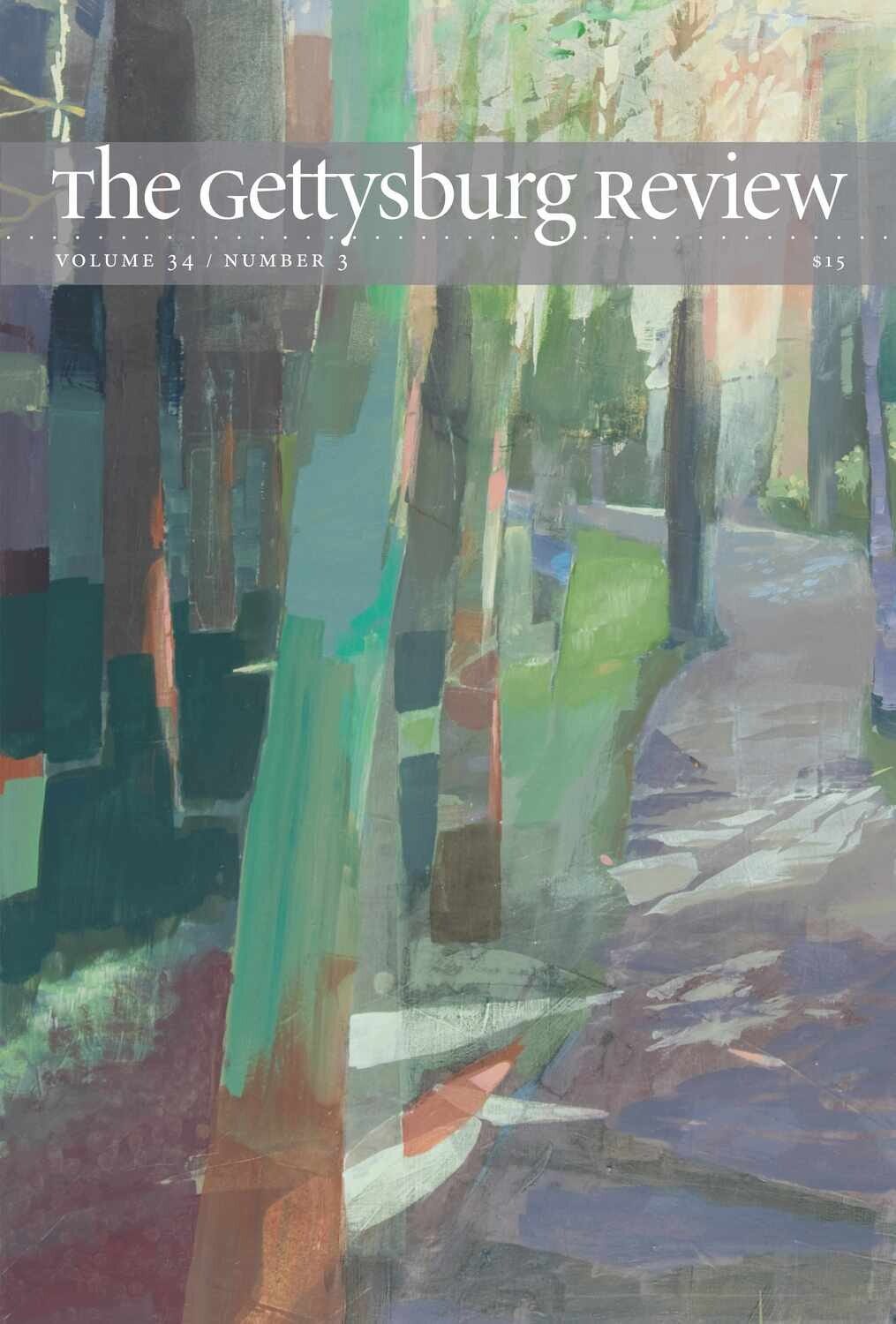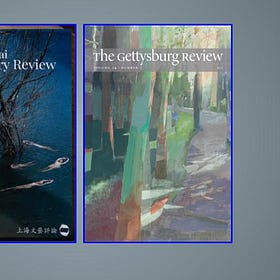Lit Mags Keep Fallin' on My Head!
Breaking free from "digital dictatorship;" reflections on publishing poetry; inside Blackbird and Fiction Magazine; submissions advice from Room & Pleiades Editors; jobs, markets & more
Welcome to our bi-weekly news roundup!
Greetings Lit Magosophers,
Lit Mag News bi-weekly news round-ups are back! Here is what’s happening.
At Esquire, Will Blythe has written about the changing landscape of literary fiction. While the death of literary fiction has been written about to, well, death, Blythe offers notions worth thinking about…
Are you multi-tasking as well, working online, Zooming, Googling, communicating with your fellow employees, but also darting off now and then to your favorite venues…and then back to your job, back and forth, back and forth, back and forth?
…Can you read anything at all from start to finish…without your mind being sliced apart by some digital switchblade? Without your seeking distraction as a form of entertainment, or entertainment as a form of distraction?…
…I [knew] a different world, at least once upon a distant time….[M]agazines…were physically everywhere—on our coffee tables at home, in waiting rooms, libraries, airplanes and trains; and being sold at newsstands, bookstores, drugstores and magazine shops that vended only magazines, hundreds of different periodicals, maybe even thousands, including literary journals...
Blythe ends on a meditative note, and, to my mind, an important one:
…The very process of reading in itself is a generous, enriching form of solitude, meditational in fact, but it is also a calm instigation of independence, and maybe even an ongoing incentive for intellectual revolution. It allows a reader, especially in this digital age, to think more freely rather than being dictated by aggressive algorithms.…fiction at large, and short stories in particular, remain as exhilarating as ever, the embodiment of an infinite variety of visions and voices, and powerful alternatives to the standard nature of the current mind, regardless of whether literary fiction is now harder to find, publish, promote, and write in this era of digital dictatorship.
Over at The Walrus, Carmine Starnino’s Editor’s Letter offers some insights into what distinguishes this Canadian journal, and the efforts of his magazine to keep readers engaged.
When I began editing poetry for The Walrus in 2016, it was with the understanding that, unlike journals that cater specifically to the verse community (a coterie composed largely of academics and creative writing teachers and students), we are one of the few Canadian publications that connect poems to the general reader. Poets are now the primary consumers of what they produce. And as they have consolidated the art around their own needs, its cultural significance has plummeted. Keeping the art alive for that wider audience became a priority for me. It meant finding poems that could appear alongside some of the country’s best investigative reporting, memoirs, and essays. I try hard to find work that can defeat the doubts and preconceptions keeping otherwise well-read adults from giving poetry a chance.
Meanwhile, back in the U.S., budget cuts at Columbia College of Missouri have compelled the university to lay off 57 employees, including several from the English and Creative Writing department. This includes Cora Jacobs, “who worked 15 years as managing editor for the department’s publications, including three years at the top of Allium…”
“My fondest memories have all been alike: The new magazine arrives at Columbia and the editor and I nervously (or maybe it was just I that was nervous) hold a fresh copy, glance through the pages, read a poem or excerpt, feel the luxury of photo paper between signatures, admire the beauty of the cover, and congratulate each other on a job well done,” [Jacobs] said. “I’ll miss that the most.”
In more uplifting news (insofar as literary collaborations with Amazon may be deemed “uplifting”), the Amazon Literary Partnership has announced its 2023 grant recipients. “Guided by the mission of having a lasting impact on the literary community, Amazon Literary Partnership has provided more than $16 million in funding to 160 organizations since 2009. The grants have assisted tens of thousands of writers in telling their stories, amplifying their work, and finding their audiences.” Awardees include A Public Space, Alaska Quarterly Review, One Story, n+1 and others.
Esteemed online mag Blackbird got some positive press recently. Writes Joan Tupponce:
Blackbird: an online journal of literature and the arts changed the way people think of online literary journals after publishing its inaugural issue in April 2002 featuring two Pulitzer Prize winners, a future U.S. Poet Laureate, a future National Book Award winner and a PEN/Faulkner finalist.
Now 21 years and 22 volumes later, Blackbird is one of the top literary journals in the world with readers across the globe. It has published everything from poems and fiction to essays with embedded “illustrations that talk” and audio recordings of plays performed by professional actors.
Since its inception, it has set the standard for university online journals.
If you’d like to learn more about Fiction Magazine and Mark Jay Mirsky, one of the magazine’s founders (alongside Donald Barthelme, Jane DeLynn, and Max Frisch), this interview may be of interest. Says Mirsky,
The joy of writing is discovering that all of these people live in you. Yes, they all come from you, but they turn into other people. You become them. It’s also why you read literature. To enter strange worlds. You become unhinged by something you can’t explain but that you desire. Because it promises something.
For those of you seeking submissions advice, Room Editor Rachel Thompson has some gems. In How to Get Out of the Slush Pile, she says,
Writing that doesn’t begin at a critical moment upon which everything else hinges, or with an opening line that raises more questions than answers, is unlikely to hold my attention for long. You never quite appreciate in media res until you’ve read hundreds of submissions that languish in the beginning.
At Poets and Writers, Pleiades Editor Jennifer Maritza McCauley also describes what she likes to see in submissions:
…I’m searching for a writer who trusts their own voice and their grip on the craft. I’m looking for work that feels fresh and wildly new, that feels like no other author could have written this particular piece, that makes the familiar deliciously unfamiliar and unique. I want characters who bounce off the page and sound, talk, and act like fully fleshed out people whom I might someday meet—or might not want to meet.
Lastly, a few lit mags have made big announcements.
Waxwing is taking a hiatus. According to their submisssions page, “We have been undergoing staff transitions for the past two years and are working to rebuild our team.”
Bluepepper Editor Justin Lowe posted a note to readers:
After eighteen long and fruitful years it is time to pull down the shutters on Bluepepper. It hasn't been an easy decision to make, but it has been a long time coming and, after a succession of less than savoury exchanges with members of the poetry fraternity, I decided I no longer had the energy or inclination to contine [sic] administering the site.
As many editors will tell you with a wistful sigh, the tone of much of the discourse on social media is trending downwards at a rapid rate. Which isn't to say I haven't relished the opportunity to make contact with so many wonderful writers and poets from all over the globe. It is just that the cons are starting to nip at the heels of the pros and I want to quit while I'm still ahead.
For those of you seeking gainful employ:
Granta seeks an Editorial Assistant.
Conjunctions seeks a Managing Editor.
The Cardiff Review seeks a Poetry Editor.
Bellevue Literary Review seeks a Poetry Editor.
The Rumpus seeks an Editor-in-Chief.
The Adroit Journal has various positions open.
The Portrait of New England has several openings.
For those of you seeking homes for your latest & greatest:
The latest Sub Club newsletter lists 42 Newly Opened Submission Calls That Pay
The latest Poets and Writers Lit MagNet profiles Greg Marshall and lit mags that first published the essays that grew into his memoir.
CLMP lists calls for submissions, including contests.
Erika Dreifus’s latest newsletter offers “dozens of carefully curated, fee-free opportunities that pay writers for their fiction, poetry, & nonfiction.”
Erica Verrillo’s blog has 80 Calls for Submissions in August 2023 - Paying markets and 40 Writing Contests in August 2023 — No entry fees
Authors Publish has 30 Themed Submission Calls and Contests for August 2023 and 5 Paying Literary Magazines to Submit to in August 2023.
As for us, lots of stuff coming up in the weeks ahead, my friends!
There will be a lit mag hangout/Q & A/info-session/gab & gossip/meet & greet/call-it-whatever-you-want-but-it-will-be-fun! super fantastic event later this month. Date and time to be announced soon.
There will also be an interview with Courtney Harler, Editor of Craft on August 23rd.
Details, including registration links, are coming your way shortly.
Also! If you are part of the Lit Mag Reading Club and you have not yet ordered your copy of Gettysburg Review, go on and do that now!
My own copy just came in the mail. The cover is so beautiful I am tempted to eat it.
Don’t worry—I won’t eat it. I will read it instead. Then I hope to discuss it with all of you!
To learn more about joining the Lit Mag Reading Club and ordering your 20% discounted copy of Gettysburg Review, please click here:
Lit Mag Reading Club is Back! Plus a Special Treat!
Hello, friends. I am now back in the U.S., gloomily resigning myself to city smog and the options for cheese at my local supermarket, among other things. Only one thing can cheer me up, and that is getting to see your faces during our new line-up of interviews and info sessions for the months ahead!
By the by, I am currently filling out the schedule for editor interviews and our Lit Mag Reading Club in the months ahead. If you edit a lit mag that has been around for 3+ years and would like to be included, do drop me a line! (You can reply to this newsletter or find my contact info here.)
And that you adventuresome sin-seekers and wild-eyed cravers of extra-special and ultra-terrestrial existential experience, you boundary pushers and margin re-definers, you who lust after the mind melds and you who long to bend time into heliotropic units of infinity, you blinking starry-eyed at the speaking clusters of leaves on the sun-dappled summer trees (yes, speaking, because did you know trees can talk?), and you dropping acid down by the waterfall—or maybe that was your adolescent self, and maybe it wasn’t a waterfall, heck, maybe it wasn’t even acid—you whose questions are so green they’re electric and you whose thoughts are so scattered yet might be quaintly re-branded as “eclectic,” you who dibble dabble in the forbidden arts of wandering through the woods of your own curious and ever-expanding stretchy and rubbery and oh so slippery thing otherwise known as a human self, or so they say, but who knows, who knows anything at all, ever, now, or even then, amidst the mad swirl of time’s rabid unraveling, is the news in literary magazines.
Have a most mystical magical week, everyone.
Fondly,
Becky
Got a question, comment, suggestion, smoothie recipe, celery juice fixation or Satanic verse?
Know some teachers, students, neighbors, gentle archivists, worried parents or over-educated bounty hunters who need this newsletter right now?
Want to attend monthly info sessions, join the Lit Mag Reading Club, get lit mag discounts, access all the content on this site, and help keep this place running for all of eternity and beyond?






Thanks for this update, and especially for sharing the good news about Blackbird. If I could, please allow me to give a shout-out to Blackbird's sponsor: Virginia Commonwealth University in Richmond. I'm always grateful when colleges and universities continue to commit to sponsoring literary journals.
What a shame about Bluepepper's reason for shutting down.